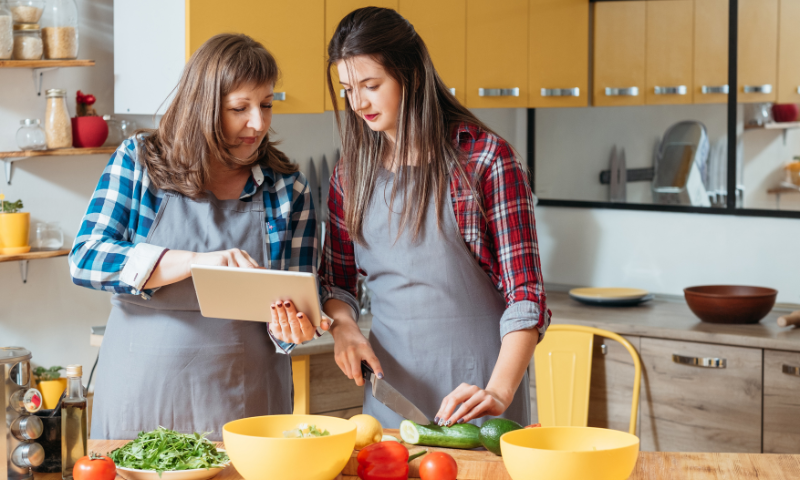Rainy days provide the perfect opportunity to sharpen your culinary skills! Cooking can be a therapeutic activity that not only helps you relax but also allows you to experiment with healthy recipes. By creating your meals, you have complete control over the ingredients, ensuring that your diet remains in line with your health goals.
Try the following family-friendly healthy cooking activities to take advantage of those days when you’re stuck inside!
Family Friendly Healthy Cooking Activities
Healthy Recipe Challenges
Gather your family and immerse yourselves in a healthy recipe challenge. Choose a few ingredients and encourage each person to come up with a nutritious, delicious dish. This not only engages everyone in an entertaining competition but also can spark an interest in healthy eating practices.
- Vegetarian Delight: Challenge each family member to create a vegetarian dish that is as flavorful as it is colorful. This encourages exploration of different vegetables and legumes.
- Smoothie Bowl Art: Compete to see who can create the most beautiful and nutritious smoothie bowl. This activity combines creativity with the challenge of incorporating a variety of fruits, seeds and nuts.
- Around the World: Pick different countries each week and prepare dishes native to those regions, focusing on healthy versions of traditional recipes. This broadens cultural knowledge and appreciation for international cuisines.
- One-Pot Wonders: Task each person with creating a healthy, hearty meal using only one pot. This promotes simplicity and creativity, showing that healthy eating can also be convenient.
- Salad Jar Showdown: Build layered salads in jars, emphasizing a balance of textures, colors and nutritional content. This challenge highlights the convenience and aesthetics of healthy meals.
Meal Prep Sessions
Use the downtime of a rainy day to batch prepare your meals for the upcoming days. This strategy ensures that you have healthy, portioned meals at the ready. Break out the cutting boards, containers and your favorite cookbooks to streamline your meal prep routine.
- Organize Your Space: Begin by clearing and cleaning your kitchen workspace. An organized kitchen promotes efficiency and makes the cooking process more enjoyable.
- Plan Your Menu: Decide on the meals you’ll prepare ahead of time. Consider variety and balance, ensuring each meal has a good mix of proteins, carbohydrates and fats.
- Prep Ingredients in Bulk: Chop vegetables, cook grains and prepare proteins in bulk. This saves time and energy during the week when assembling your meals.
- Use the Right Containers: Invest in quality portion-control containers. Glass containers are ideal because they are durable, microwavable, and do not hold onto food odors or stains.
- Label Your Meals: Take note of the contents and the date prepared on each meal container. This helps you keep track of what you have and ensures you eat the meals while they are still fresh.
- Incorporate Leftovers: Be creative and think of ways to repurpose leftovers. This minimizes waste and adds variety to your weekly meal plan.
- Stay Hydrated: Remember to prepare infused waters or iced herbal teas during your meal prep. Keeping these readily available will encourage you to stay hydrated throughout the week.
Want some more prep tips? Take a look at these other posts:
- Meal-prepping Tips to Stay on Track and Eat Healthy
- Tips for Getting Started or Easing Back into Meal Prep
- How to Plan Healthy Meals When You’re Running Against the Clock
Nutritional Classes Online
Take advantage of online platforms that offer cooking classes focused on nutrition. These classes can provide insights into the best ways to incorporate wholesome ingredients into your diet. Learn about balanced meal planning, the benefits of superfoods, and cooking techniques that retain the most nutrients.
- Explore Plant-Based Diets: Sign up for classes that focus on plant-based cooking. These sessions can introduce you to a wide range of vegetables, fruits, grains and legumes while teaching you creative ways to prepare them.
- Master Healthy Baking: Look for courses that specialize in baking with less sugar, alternative flours and healthy fats. This can be a fun way to enjoy your baked favorites with a nutritious twist.
- Seasonal Cooking Insights: Join classes that emphasize cooking with in-season produce. This not only supports local farmers but also ensures that you’re eating the freshest, most nutrient-dense foods available.
- Mindful Eating Techniques: Participate in workshops that combine cooking with the practice of mindful eating. Learn how to savor your meals, listen to your body’s hunger cues, and appreciate the ingredients you use.
In conclusion, whether you’re just starting out in the kitchen and wanting to adopt healthier eating habits or a seasoned chef eager to diversify your cooking skills, these healthy cooking activities and resources offer a flavorful path to wellness and joy in cooking.






